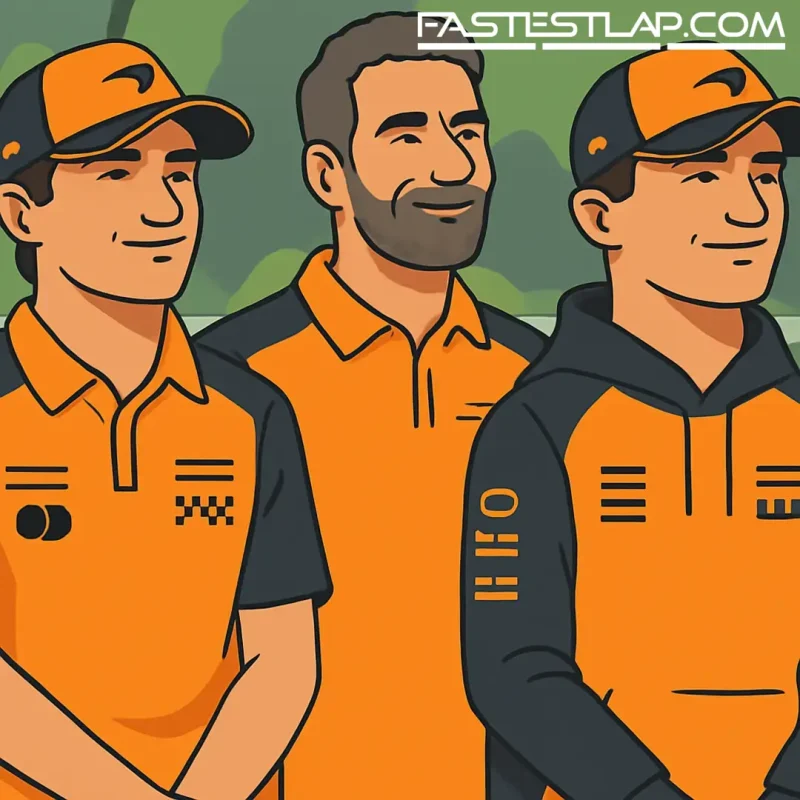McLaren’s Monza call has echoes of Austria 2002 — and that’s a road they don’t want to go down
Monza gave us vintage speed and modern politics. McLaren’s radio order asking Oscar Piastri to hand second place back to Lando Norris after a botched pit stop set social media ablaze, sparked paddock whispers and, inevitably, dragged everyone back to the sport’s most infamous team-orders flashpoint: Ferrari, Austria 2002.
If that comparison feels heavy, former F1 driver Robert Doornbos thinks it’s warranted. Speaking on The Pit Talk Podcast, he didn’t mince words: “It feels, as a fan, that you’re robbed.” Doornbos went straight to the Barrichello-Schumacher handover on the run to the line at the A1-Ring — the moment that turned a tactical tool into a PR nightmare. “It was a mess, it was just bad publicity for F1,” he said. “Luckily we haven’t had that in recent years, but now McLaren is going in that way, because they’re trying to orchestrate it.”
The controversy at Monza was less explosive, but the mechanics matter. Norris was leading his team-mate on track when McLaren boxed Piastri first, assuring Norris there’d be no undercut. A sticky wheel nut then detonated that plan: Norris sat for 5.9s — roughly four seconds longer than Piastri — and the Australian emerged ahead.
Cue the call. Twice. Piastri yielded on the second ask, Norris took back P2, and Max Verstappen won. Piastri shadowed the sister car to the flag in third, his advantage in the standings trimmed to 31 points. On paper, it’s just a tactical reset. To the watching world, it looked like a hand-baked result.
And that’s why this stings. Fans will accept strategy; they bristle at choreography.
David Coulthard said McLaren “manipulated the result.” Bernie Ecclestone went further, telling Blick: “You slowly get the feeling that McLaren prefers a World Champion named Lando Norris.” That line isn’t evidence of a conspiracy — but it does capture how quickly perception hardens when a team asks one driver to step aside for another, especially when the team’s public mantra has long been about racing values and letting their drivers sort it on track.
Context matters too. Austria 2002 was for the win, with Schumacher already well clear in the title race, and it produced such fury that the FIA fined Ferrari and effectively outlawed team orders for years. Today, team orders are legal again and routinely used, but there’s an invisible red line between smart race management and stagecraft. McLaren flirted with it at Monza.
What complicates this is the dynamic inside the papaya garage. Norris and Piastri are fast, clean and relentlessly matched — a core strength that’s also a political pressure cooker in a championship fight. When your drivers are this closely paired, tiny calls carry huge optics. Tell one to stand down and you’d better have a watertight reason.
McLaren’s explanation — preserving the original running order given the undercut promise — is defensible. If that was the pre-race principle, then fair enough. But principles cut both ways. Doornbos posed the obvious follow-up: what happens next time the roles reverse? If it’s Norris who gains through circumstance, does he hand it back to Piastri without debate? The answer, more than the Monza call itself, will determine whether this story fades or festers.
There’s also a sporting reality McLaren can’t ignore. You don’t throw away points if you’ve got a shot at silverware. Verstappen’s win underscored how fine the margins are. One slow stop, one conservative call, and a win slips out of reach. The temptation to prefer the path of least resistance — a de facto number one — is understandable. It’s also the quickest way to sour a garage when both drivers are in the hunt.
Ferrari learned that the hard way in 2002. Even Schumacher, awkwardly handing Barrichello the trophy and the top step to quell the boos, knew how it looked. That day became a cautionary tale because it turned an F1 race into theatre. McLaren’s not there — not close — but the comparison surfaced because the optics rhymed: instructions, optics, outrage.
The fix isn’t complicated. Be clear, be consistent, and be equal — until you openly decide not to be. If the team chooses to back one driver for the title late in the year, say it and own it. If not, let them race and live with the risk that sometimes your own guys will nick points off each other. The worst place to be is the grey area, where promises are made, exceptions are carved mid-race, and everyone wonders whose principles matter most.
Monza should be a footnote in a long season, not a defining chapter. But it becomes the latter if, the next time the cards fall the other way, the radio stays quiet. That’s when the 2002 comparisons won’t feel like a reach — they’ll feel like a pattern.
For now, McLaren escapes with a lesson and a reminder: in this sport, winning hearts can be harder than winning points. And the fans have long memories.




